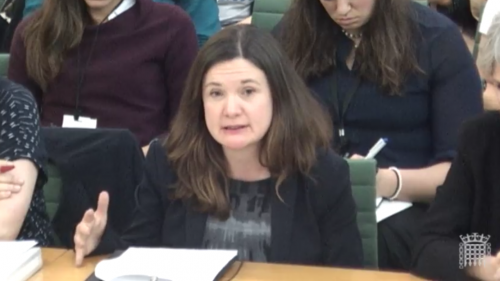EPI Director of Mental Health Emily Frith gave evidence on the role of education in children and young people’s mental health this afternoon, as part of a joint inquiry held by the House of Commons Health and Education committees.
The inquiry, which held its first oral evidence session after inviting organisations to submit written evidence, also featured Professor Dame Sue Bailey of the Children’s and Young People’s Mental Health Coalition, Sarah Brennan of Young Minds, and Kate Fallon of the Association of Educational Psychologists.
The session examined how health and education services currently cooperate in the area of mental health, the success of early intervention and prevention in schools, and the impact of wider financial pressures.

Emily Frith explained to both committees that at present mental health support is inadequate – and is marked by a lack of data on the level of provision in educational settings. In outlining the state of children’s mental health services (CAMHS) and the importance of early intervention, she cited EPI research which found that specialist CAMHS were turning away, on average, about a quarter (23 per cent) of the children and young people referred to them for treatment.
The panel also considered the extent to which teachers should engage with those experiencing mental health problems – and whether currently, teachers are equipped with sufficient training and skills.
In response, EPI’s Director of Mental Health stated that the processes of Initial Teacher Training (ITT) and continuous professional development (CPD) needed to incorporate evidence-based mental health training – with schools also having an obligation to provide basic training for all staff. Despite the government having taken promising steps to improve support offered to schools, staff were often unaware of the resources available to them.
Those submitting oral evidence were also given questions by the joint committee on the influence of social media – including whether technology companies needed to take more responsibility for cyberbullying and other areas which brought online safety issues.
Emily Frith said that due to rapid changes in technology, and social media habits becoming more private, it is increasingly hard for parents to ensure the safety of children and young people online. Here, she stressed the need for young people to be taught “social and emotional resilience, but also teachable digital skills” – whilst calling on the government to produce a strategy to empower young people to live safe digital lives.
You can watch the session in full here.
The Education Policy Institute’s written submission to the Select Committee Inquiry can be read here.
